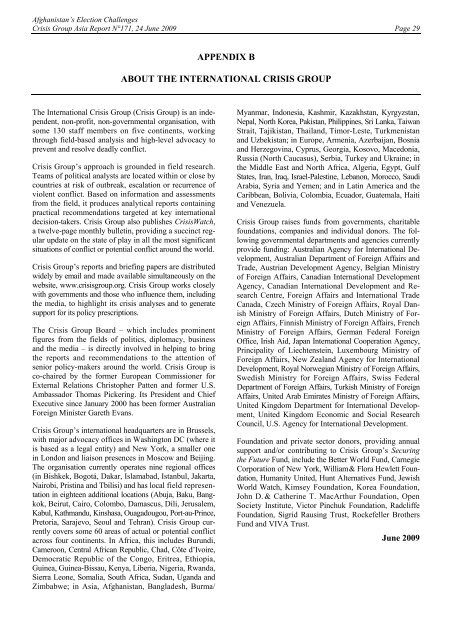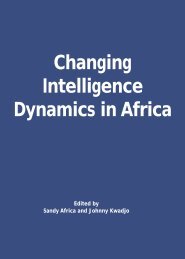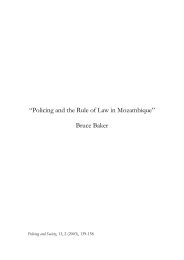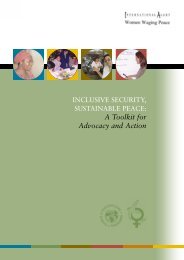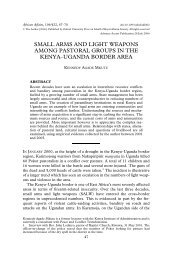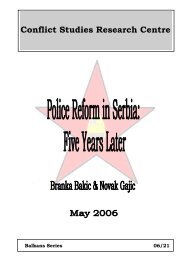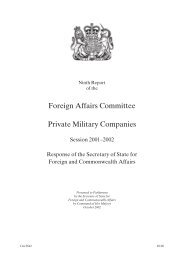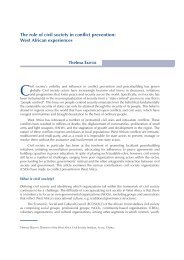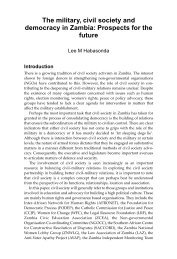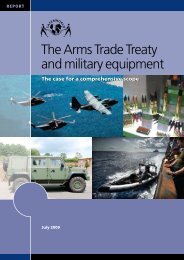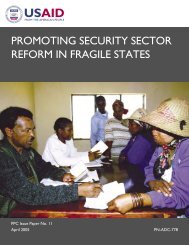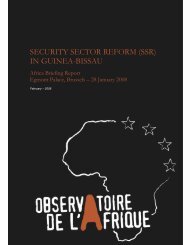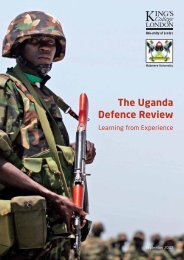AFGHANISTAN'S ELECTION CHALLENGES
AFGHANISTAN'S ELECTION CHALLENGES
AFGHANISTAN'S ELECTION CHALLENGES
Create successful ePaper yourself
Turn your PDF publications into a flip-book with our unique Google optimized e-Paper software.
Afghanistan’s Election Challenges<br />
Crisis Group Asia Report N°171, 24 June 2009 Page 29<br />
APPENDIX B<br />
ABOUT THE INTERNATIONAL CRISIS GROUP<br />
The International Crisis Group (Crisis Group) is an independent,<br />
non-profit, non-governmental organisation, with<br />
some 130 staff members on five continents, working<br />
through field-based analysis and high-level advocacy to<br />
prevent and resolve deadly conflict.<br />
Crisis Group’s approach is grounded in field research.<br />
Teams of political analysts are located within or close by<br />
countries at risk of outbreak, escalation or recurrence of<br />
violent conflict. Based on information and assessments<br />
from the field, it produces analytical reports containing<br />
practical recommendations targeted at key international<br />
decision-takers. Crisis Group also publishes CrisisWatch,<br />
a twelve-page monthly bulletin, providing a succinct regular<br />
update on the state of play in all the most significant<br />
situations of conflict or potential conflict around the world.<br />
Crisis Group’s reports and briefing papers are distributed<br />
widely by email and made available simultaneously on the<br />
website, www.crisisgroup.org. Crisis Group works closely<br />
with governments and those who influence them, including<br />
the media, to highlight its crisis analyses and to generate<br />
support for its policy prescriptions.<br />
The Crisis Group Board – which includes prominent<br />
figures from the fields of politics, diplomacy, business<br />
and the media – is directly involved in helping to bring<br />
the reports and recommendations to the attention of<br />
senior policy-makers around the world. Crisis Group is<br />
co-chaired by the former European Commissioner for<br />
External Relations Christopher Patten and former U.S.<br />
Ambassador Thomas Pickering. Its President and Chief<br />
Executive since January 2000 has been former Australian<br />
Foreign Minister Gareth Evans.<br />
Crisis Group’s international headquarters are in Brussels,<br />
with major advocacy offices in Washington DC (where it<br />
is based as a legal entity) and New York, a smaller one<br />
in London and liaison presences in Moscow and Beijing.<br />
The organisation currently operates nine regional offices<br />
(in Bishkek, Bogotá, Dakar, Islamabad, Istanbul, Jakarta,<br />
Nairobi, Pristina and Tbilisi) and has local field representation<br />
in eighteen additional locations (Abuja, Baku, Bangkok,<br />
Beirut, Cairo, Colombo, Damascus, Dili, Jerusalem,<br />
Kabul, Kathmandu, Kinshasa, Ouagadougou, Port-au-Prince,<br />
Pretoria, Sarajevo, Seoul and Tehran). Crisis Group currently<br />
covers some 60 areas of actual or potential conflict<br />
across four continents. In Africa, this includes Burundi,<br />
Cameroon, Central African Republic, Chad, Côte d’Ivoire,<br />
Democratic Republic of the Congo, Eritrea, Ethiopia,<br />
Guinea, Guinea-Bissau, Kenya, Liberia, Nigeria, Rwanda,<br />
Sierra Leone, Somalia, South Africa, Sudan, Uganda and<br />
Zimbabwe; in Asia, Afghanistan, Bangladesh, Burma/<br />
Myanmar, Indonesia, Kashmir, Kazakhstan, Kyrgyzstan,<br />
Nepal, North Korea, Pakistan, Philippines, Sri Lanka, Taiwan<br />
Strait, Tajikistan, Thailand, Timor-Leste, Turkmenistan<br />
and Uzbekistan; in Europe, Armenia, Azerbaijan, Bosnia<br />
and Herzegovina, Cyprus, Georgia, Kosovo, Macedonia,<br />
Russia (North Caucasus), Serbia, Turkey and Ukraine; in<br />
the Middle East and North Africa, Algeria, Egypt, Gulf<br />
States, Iran, Iraq, Israel-Palestine, Lebanon, Morocco, Saudi<br />
Arabia, Syria and Yemen; and in Latin America and the<br />
Caribbean, Bolivia, Colombia, Ecuador, Guatemala, Haiti<br />
and Venezuela.<br />
Crisis Group raises funds from governments, charitable<br />
foundations, companies and individual donors. The following<br />
governmental departments and agencies currently<br />
provide funding: Australian Agency for International Development,<br />
Australian Department of Foreign Affairs and<br />
Trade, Austrian Development Agency, Belgian Ministry<br />
of Foreign Affairs, Canadian International Development<br />
Agency, Canadian International Development and Research<br />
Centre, Foreign Affairs and International Trade<br />
Canada, Czech Ministry of Foreign Affairs, Royal Danish<br />
Ministry of Foreign Affairs, Dutch Ministry of Foreign<br />
Affairs, Finnish Ministry of Foreign Affairs, French<br />
Ministry of Foreign Affairs, German Federal Foreign<br />
Office, Irish Aid, Japan International Cooperation Agency,<br />
Principality of Liechtenstein, Luxembourg Ministry of<br />
Foreign Affairs, New Zealand Agency for International<br />
Development, Royal Norwegian Ministry of Foreign Affairs,<br />
Swedish Ministry for Foreign Affairs, Swiss Federal<br />
Department of Foreign Affairs, Turkish Ministry of Foreign<br />
Affairs, United Arab Emirates Ministry of Foreign Affairs,<br />
United Kingdom Department for International Development,<br />
United Kingdom Economic and Social Research<br />
Council, U.S. Agency for International Development.<br />
Foundation and private sector donors, providing annual<br />
support and/or contributing to Crisis Group’s Securing<br />
the Future Fund, include the Better World Fund, Carnegie<br />
Corporation of New York, William & Flora Hewlett Foundation,<br />
Humanity United, Hunt Alternatives Fund, Jewish<br />
World Watch, Kimsey Foundation, Korea Foundation,<br />
John D. & Catherine T. MacArthur Foundation, Open<br />
Society Institute, Victor Pinchuk Foundation, Radcliffe<br />
Foundation, Sigrid Rausing Trust, Rockefeller Brothers<br />
Fund and VIVA Trust.<br />
June 2009


